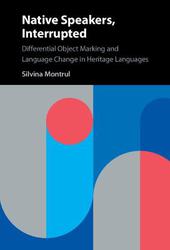
|
Native Speakers, Interrupted: Differential Object Marking and Language Change in Heritage Languages
Hardback
Main Details
| Title |
Native Speakers, Interrupted: Differential Object Marking and Language Change in Heritage Languages
|
| Authors and Contributors |
By (author) Silvina Montrul
|
| Physical Properties |
| Format:Hardback | | Pages:280 | | Dimensions(mm): Height 229,Width 152 |
|
| Category/Genre | linguistics
Grammar and syntax |
|---|
| ISBN/Barcode |
9781107133372
|
| Classifications | Dewey:306.4460973 |
|---|
| Audience | |
|---|
|
Publishing Details |
| Publisher |
Cambridge University Press
|
| Imprint |
Cambridge University Press
|
| Publication Date |
22 December 2022 |
| Publication Country |
United Kingdom
|
Description
A heritage language is the term given to a language spoken at home by bilingual children of immigrant parents. Written by a leading figure in the field, this pioneering, in-depth study brings together three heritage languages - Hindi, Spanish and Romanian - spoken in the United States. It demonstrates how heritage speakers drive morphosyntactic change when certain environmental characteristics are met, and considers the relationship between social and cognitive factors and timing in language acquisition, bilingualism, and language change. It also discusses the implications of the findings for the language education of heritage speakers in the USA and considers how the heritage language can be maintained in the English-speaking school system. Advancing our understanding of heritage language development and change, this book is essential reading for students and researchers of linguistics and multilingualism, immigration, education studies and language policy, as well as educators and policy makers.
Author Biography
Silvina Montrul is Professor in the Departments of Spanish and Portuguese and of Linguistics at the University of Illinois at Urbana-Champaign, and directs the Second Language Acquisition and Bilingualism Lab. She is co-editor of the journal Second Language Research and has authored several books, including Incomplete Acquisition in Bilingualism (2008) and The Acquisition of Heritage Languages (2016).
|